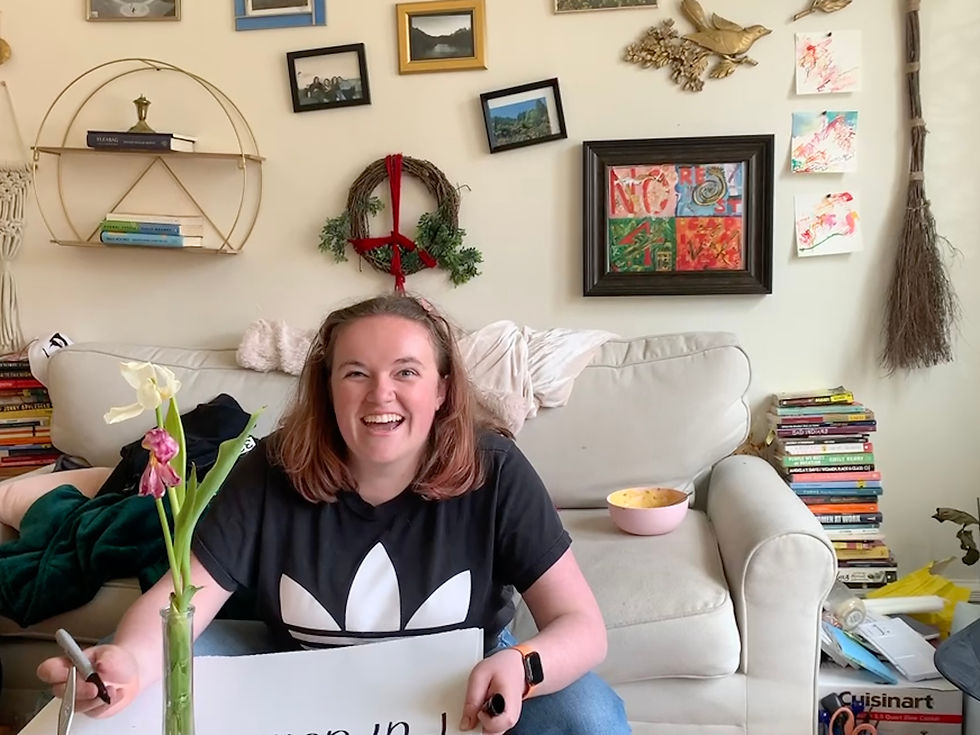a character study on caroline calloway & capitalism
- sarah critchfield

- May 10, 2022
- 4 min read

Okay, so today’s blog post is going to take on an entirely new format. I’m doing research for my novelle and decided I’m gonna release blog posts about the materials I engage with! This can’t really be labeled as an essay because I refuse to use proper citation and this won’t have a thesis or a conclusion but...I hope you enjoy it.
If you know me you know that I have an unhealthy interest in Caroline Calloway. I’ve watched Ziwe’s interview of her on Instagram live, read Natalie Beach’s scathing The Cut article, read Brock Coyler's profiles on her, and listened to way too many podcasts interviewing her. I also read the “I Am Caroline Calloway” exclusive she self-published on her website before she took it down because she alleges that it will be included in her yet-to-be-released manuscript (in the podcast I just listened to she said she expects the book to come out in the next 3 to 6 years which is such a procrastination nation slay).
Caroline is the embodiment of my English major dreams and fears.
I am working on Unpopped again and have been referencing a few Caroline Calloway articles for…spoiler alert…character development ideas. I want Unpopped to cover the neoliberal yassification of art and activism (specifically in the “sex-positive” political movement) and I think Caroline Calloway’s engagement with literature, publishing, and sex work is indicative of an entire generation of a certain class.
The main conversation she stirs up for me is the way she engages with narrative, persona, and capital. She is a glamorous spectacle that is a master at performing vulnerability online.
She also went to NYU which is every midwestern writer’s dream school until they meet someone that went or goes there (except of course for Emma Patton, Bowen Yang, Matt Rogers, and Rachel Sennott among others…).
I embarrassingly relate to the way she self-narrativizes.
Seeing myself as the main character enables me to exist not as a person with biases that need to be addressed but as an antihero with charming quirks that equip me to overcome obstacles. My cruel accusations to my mom when she didn’t let me stay out with friends in high school can be rewritten as displays of adolescent angst and the pain of growing out of girlhood (my mom says this is more commonly known as being bitchy).
Caroline Calloway admits to pretty privilege without apology. In fact, she openly turns it into profit (her now-defunct skincare product “Snake Oil” uses her genetic predisposition to a clear complexion as its first-hand testimony to its effectiveness).
I don’t mean to come across as holier than thou because I too rely on appearance for income (I’m a bartender begging for tips with my tits out). But is being aware of privilege actually that radical of an act?
Maybe I’m not allowing for enough nuance because I felt similarly about Emily Ratajkowski in her book My Body. One of her chapters discusses the motivations behind the value of selling her own bikinis instead of using her body as a vessel to sell other people’s bikinis. Is it feminist to strive for capital gain in an unjust system? I guess second wavers would say yes?
Is this immoral? Is there morality when it comes to capitalism? Or are we all just suffering girl boss brain rot?
I fall prone to the nihilistic belief (with the help of a few convincing Instagram graphics) that there is no ethical consumption under capitalism (which, as a sentiment, I’m starting to realize is more clickbait into complacency and less of a political rallying cry to dismantle systems) but I’m especially unable to figure out how to ethically create under capitalism.
Nothing pisses me off more than paywalls. I hate subscription fees, Patreon memberships, the ever-growing list of streaming services, and everything in between. I hate that so much of Milwaukee’s art scene is funded by private donors and partnerships with massive businesses and banks.
But, I will also be the first to scream “Pay Artists!” and pay $40 for a zine put together by a self-identified “healer.” I’m also admittedly an annual Patreon subscriber to Julia Hava and Eliza McLamb’s Binchtopia…
Caroline’s decision to use Instagram as her initial medium of choice is also fascinating because it makes me wonder about all the ways that unaffiliated artists and “content creators” generate profit for media companies like TikTok, Facebook, Patreon, YouTube, Vimeo, and Substack (this is my reminder to read Algorithms of Oppression by Safiya Noble).
Like, as of May 10th, 2022 at least, online media created by the “average person” is free and accessible to all users (outside of self-appointed paywalls on sites like Patreon, Vimeo, OnlyFans, and Substack). But all the traffic a post generates affects the profits that the platform it’s posted on makes—especially if it utilizes ad revenue (this is a crash course in business school—which is really just improv class in a suit).
This is kind of becoming a long-winded diary entry and I don’t have any answers just lots of questions. There's so much more that I can cover when it comes to this topic—influencers, passive income, Caroline's movie deal, intellectual property, and everything in between.
I want to do another blog post about sex positivity so I’m gonna talk about OnlyFans’ effects on sex work at a later date. For today’s topic, I’ve drawn info from “The Journalist as Influencer,” “The Grand Unified Theory of Aesthetic Vlogging,” Leigh Stein's writing, and Trick Mirror by Jia Tolentino among other sources I've hyperlinked.
If you have any essays, books, podcasts, video essays, etc. that cover or relate to any of these topics I would j’adore you if you dropped a link in the comments.
Video Essays I Enjoyed This Week




Comments